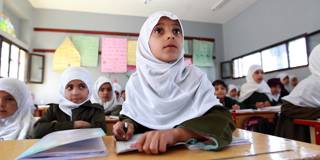Educated Arabs are much less emancipated politically and socially, on average, than their peers in other parts of the world. If Arab societies are ever to become more open, their education systems will have to embrace and promote values appropriate to that goal.
PARIS – Discussion of education in the Arab world has focused only rarely on the role of schooling in changing social and political mores. This is unfortunate, because educated citizens of Arab countries tend to be much less emancipated politically and socially, on average, than their peers in other parts of the world. If Arab societies are ever to become more open and economically dynamic, their education systems will have to embrace and promote values appropriate to that goal.

PARIS – Discussion of education in the Arab world has focused only rarely on the role of schooling in changing social and political mores. This is unfortunate, because educated citizens of Arab countries tend to be much less emancipated politically and socially, on average, than their peers in other parts of the world. If Arab societies are ever to become more open and economically dynamic, their education systems will have to embrace and promote values appropriate to that goal.